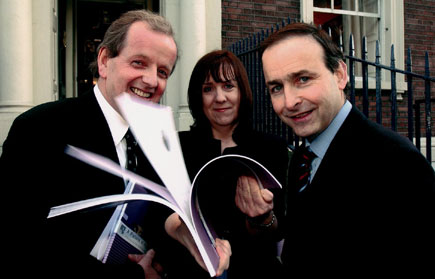| 2004 |

|
YEAR BOOK |
Health Research Board
|
New initiatives in health research
|


A key development has been the recent establishment of dedicated posts for senior medical researchers, with a special focus on the link between basic biomedical research and clinical service. Clinician Scientists are medically qualified specialists whose primary interest is in research, with a reduced commitment to clinical care that is necessary for the purposes of the delivery of their research programme and the maintenance of clinical accreditation. They are generally recognised as having a key role to play in translating research at the bench into interventions that are of benefit to patients and that contribute to the creation of intellectual property and the fuelling of bio-industry. Although a long established feature of the US, UK and European health and research systems, there was no equivalent in this country. The appointment of world-class medically qualified researchers is critical to making Ireland internationally competitive in health research and strengthening links between the universities, research hospitals and the healthcare industry. The HRB is delighted that progress has been made and the first clinician scientists should be in post in 2005.
A second initiative launched by the HRB focused on improving the quality of postgraduate training in health research. Early in 2004, two PhD training sites were awarded with funding of �2 million. One training site is being established in the Institute of Molecular Medicine based at St James's Hospital, and the other in the new Institute of Neuroscience on the main TCD campus.
The aim of these new awards, the first of their kind in Ireland, is to improve the quality of PhD training in health research by providing a broader education for young researchers and enhancing co-operation between post-graduate students in different research groups. Students follow a structured training programme for the first year, with courses in research methods, ethics, commercialisation and communications skills. Funding is provided for four years rather than the standard three and the choice of research project is made only at the end of the first year.
The successful sites were chosen following a highly competitive process in which applications were reviewed by an international panel. Both have a strong focus on translational research, which aims to provide a bridge between biomedical sciences and clinical applications that improve care of patients.
The first training site is based at the Institute of Molecular Medicine, St James's Hospital, and is led by Professor Dermot Kelleher. This four-year PhD training programme focuses on the relationship between the external environment and a person's genetic make up in diseases such as arthritis, intestinal disease and cancer. The programme builds on existing strengths within Trinity College Dublin in the areas of genetics, cancer, immunology, neuro-psychiatric disease and the science of nutrition.
The second site is based at the Institute of Neuroscience in Trinity College and is led by Professor Marina Lynch. The students will work with neuroscientists and clinicians, using a wide range of research tools, to investigate the underlying causes of several central nervous system disorders, including the dementias, Alzheimer's Disease, multiple sclerosis, Parkinson's disease, tauopathies, schizophrenia, bipolar disorder, depression, traumatic brain injury, autism, attention deficit disorder, and blindness.
Another new initiative aims to build capacity for research and development within the health services and to improve the evidence base for health policies and interventions. 'Strategic Health Research and Development Awards' address the problems of health and social wellbeing and service delivery. Research proposals funded through this scheme are based on the research strategies of health agencies and are expected to make a specific contribution to the goals and priorities of the Health Strategy.
Finally, the HRB appreciates the continued support and goodwill of the public for health research. A new report, A Picture of Health, aims to communicate the latest developments in research in a way that is accessible to a wider audience. The first report brought together the outcomes of a selection of 54 HRB funded research projects carried out between 2000 and 2003. The research projects were funded by a variety of HRB grant schemes, including research project grants, co-funded health services research grants, Ireland-Northern Ireland research project grants and fellowships. The projects covered all areas of health research, from biomedical science to health services research, and supported scientists at various levels � including postdoctoral scientists, clinical scientists, nurses, social scientists and postgraduate students, such as PhD, MSc and MD students. Several of the stories in the report focused on the latest research into diseases of major importance in Ireland, such as cancer, heart disease and diabetes, and included some very exciting findings.
The second report in the Picture of Heath series will be published later in the year. It is hoped that the series will contribute to the public's understanding of the latest developments in health research and raise awareness of the important role that research plays in the delivery of high quality patient care.
Contact: Dr Mair�ad O'Driscoll, Health Research Board;
Tel: 01 676 1176; E-mail: [email protected] ; Web: www.hrb.ie